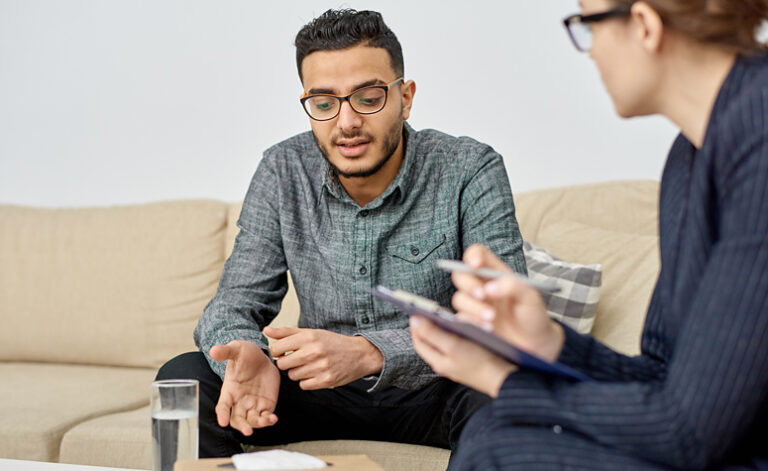Understanding and Treating Internet Addiction
Internet addiction, designated as an impulse control disorder by experts, is a type of behavioural addiction that doesn’t stem from substance abuse. Rather than consuming a harmful product in order to feel its desired effects, a person with an internet addiction will behave more like a compulsive gambler. In other words, the desire to engage in an online activity of any kind will outweigh all other aspects of the individual’s life.
A complex social problem, online addiction encompasses a wide range of issues. These include, but are not limited to:
- Compulsions to interact with social media websites
- Online shopping
- Online gambling
- Extensive viewing of online pornographic material
Over the past decades, online addiction has become a frequent topic of everyday discourse, largely due to widespread coverage of its concerning aspects in the news.
The behaviour of people with an addiction to spending time online displays the same traits as the behaviour of other types of addiction, such as drug and alcohol overconsumption. Namely, continuous and heavy use of the internet can lead to a buildup of tolerance over extended periods of time. Users will then extend their time spent online in order to achieve the same effect as they did in the early stages of their addiction.

Treatment for Internet Addiction
Casual internet users can detach themselves from daily use of modern technology. However, a subsection of users will have severe, even extreme, difficulty in reducing or fully ceasing their daily consumption of online material. In the early 21st century, it’s not uncommon for individuals to value virtual spaces and online connections more than the people and events in the real world (“IRL”, in further text). Lack of online interaction can even trigger anxiety in habitual users if they have to spend time away from their devices.
If an individual displays symptoms of anxiety and similar issues once internet interaction is interrupted, it’s a clear sign that they need to abstain from online activities.
Treating internet addiction normally involves a variety of methods. The most common ones include self-help groups, abstinence, and counselling, usually in the form of one-to-one therapies. If these methods don’t achieve tangible results, there are different 12-step rehabilitation programmes that individuals can take.
The length and specific type of internet addiction treatment will vary from person to person. Some of the factors that determine the course of the treatment include the individual’s unique condition, the types of addiction symptoms they display, and the overall level of severity. Before any step is undertaken, our professionals conduct a free initial assessment of the person with internet addiction. This approach allows our team of experts to explore the specific problems that the individual is experiencing with online addiction. The collected information enables them to create a bespoke treatment method for that particular individual.

What lies behind us and what lies before us are
tiny matters compared to what lies within us

How to Treat Internet Addiction
After the aforementioned free assessment has taken place, an expert consultant will discuss the treatment with the person in question. Afterwards, the consultant will recommend a suitable programme that can involve one of two types of treatment: inpatient or outpatient.
It’s vital to note that, unlike other types of addictive behaviour that involve substance overuse, internet addiction cannot be treated with medication. Therefore, the treatment programme assigned will involve focusing on mitigating and removing behaviours and thoughts that contribute to the compulsive urge to spend time online.
Self-help for internet addiction
To handle internet addiction, you may undergo self-help treatment. This method involves participating in self-help groups and engaging in behavioural talking therapies. The main focus of these approaches to treatment is abstinence and understanding why an individual has formed an addiction to excessive internet usage.
Self-help therapies aim to achieve several goals, including:
- Helping an individual suffering from addiction understand in what manner it has affected their daily life
- Working with inpatients to uncover any potential underlying mental issues (often, undiagnosed conditions can cause people to compulsively “surf” the internet as a form of coping)
- Getting the inpatient to focus on new activities and coping outlets that help reduce the stress and anxiety of daily life (while simultaneously avoiding excessive internet usage, or at the very least severely reducing it)

Therapy for internet addiction
The main goal of therapy sessions for this particular type of addiction is getting the inpatient to reduce the amount of time spent browsing the internet. The said goal can be achieved through cognitive behavioural therapy (or CBT, for short), family therapy, and behavioural activation techniques.
Applying CBT is effective since it helps the individual understand the impact of their addiction and how it affects their relationships with the people closest to them. Furthermore, it teaches various methods of thought and behaviour management, focusing on positive approaches.
Behavioural activation includes getting the inpatient to direct their attention to different, constructive activities. The goal is to replace addictive behaviour that comes with excessive internet use through alternative hobbies and practices. Through these forms of therapy, the individual may feel an overall mood improvement.
If the level of addiction is so severe that it affects the family unit or the romantic partner, our experts may recommend various types of either family or relationship therapy. The latter is exceptionally useful in handling cybersex-based activities or unsolicited chats with third-party individuals online.
Both of these issues can be mitigated through specific types of counselling. For instance, family counselling will benefit the inpatient by helping them resolve underlying issues affecting their current relationship with their family members and loved ones. On the other hand, marriage-specific counselling has the goal of improving overall communication with the romantic partner, as well as re-establishing the former intimate bond damaged through addiction.
Risk Factors of Internet Addiction
In important aspects, internet addiction is not dissimilar to drug or alcohol addiction. All of them provide a specific type of escape for the individual, “filling a void”, so to speak. More specifically, it’s tied to triggering the process of releasing dopamine into your system and the brain.
Dopamine is a neuromodulatory molecule sometimes called the “happy chemical”. Normally, it is released when we feel sudden and extreme joy, but the “rush” is fairly short. Regarding excessive internet use, dopamine can be released when playing computer games, interacting with other individuals via social media, or even through something as seemingly simple as receiving “likes”, “shares”, and positive validation on the individual’s personal posts. People with internet addiction will aim to trigger a dopamine release as often as possible, which leads to addictive behaviour.
Internet addiction is more prevalent in people who have different pre-existing addictions or mental health conditions like anxiety or depression (both known and/or unknown). Spending inordinate amounts of time online will actually make the mental condition worse, increasing its symptoms. Experts who focus on online addiction will typically treat the symptoms of the underlying mental conditions first, before addressing internet addiction. The operating idea is that by treating these symptoms, the need for excessive internet use will be reduced.
Overall difficulty in forming and maintaining social relationships can also be an underlying symptom of online addiction. That’s especially the case with individuals who form entirely digital relationships and attach themselves emotionally to online users in chat rooms, on social networks, and in other virtual communities.
FREE Addiction Assessment
If your or a loved one are struggling with addiction, we understand the challenges you’re facing and we’re here to offer compassionate help.
Our highly trained advisers are available to speak to you right away, simply call 0808 252 3379 today.
We can discuss your concerns in complete confidence, explore the options for treatment, and help you to understand what will work best for you.
We’ll also help you to book your free addiction assessment there and then, with appointments usually available within only a few days.
We understand that taking the first step can be the most difficult, but we’re here to support – with no pressure or judgement.
Professional and compassionate help is just a phone call or click away.




